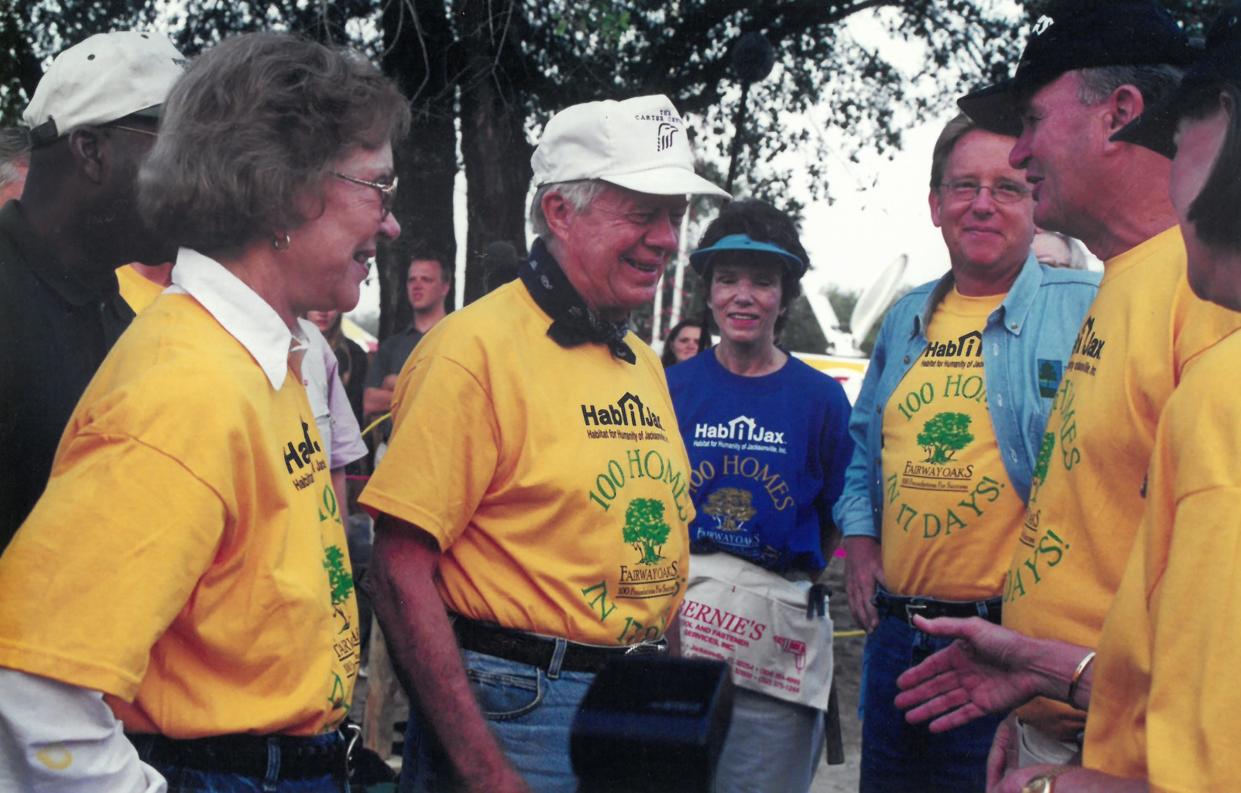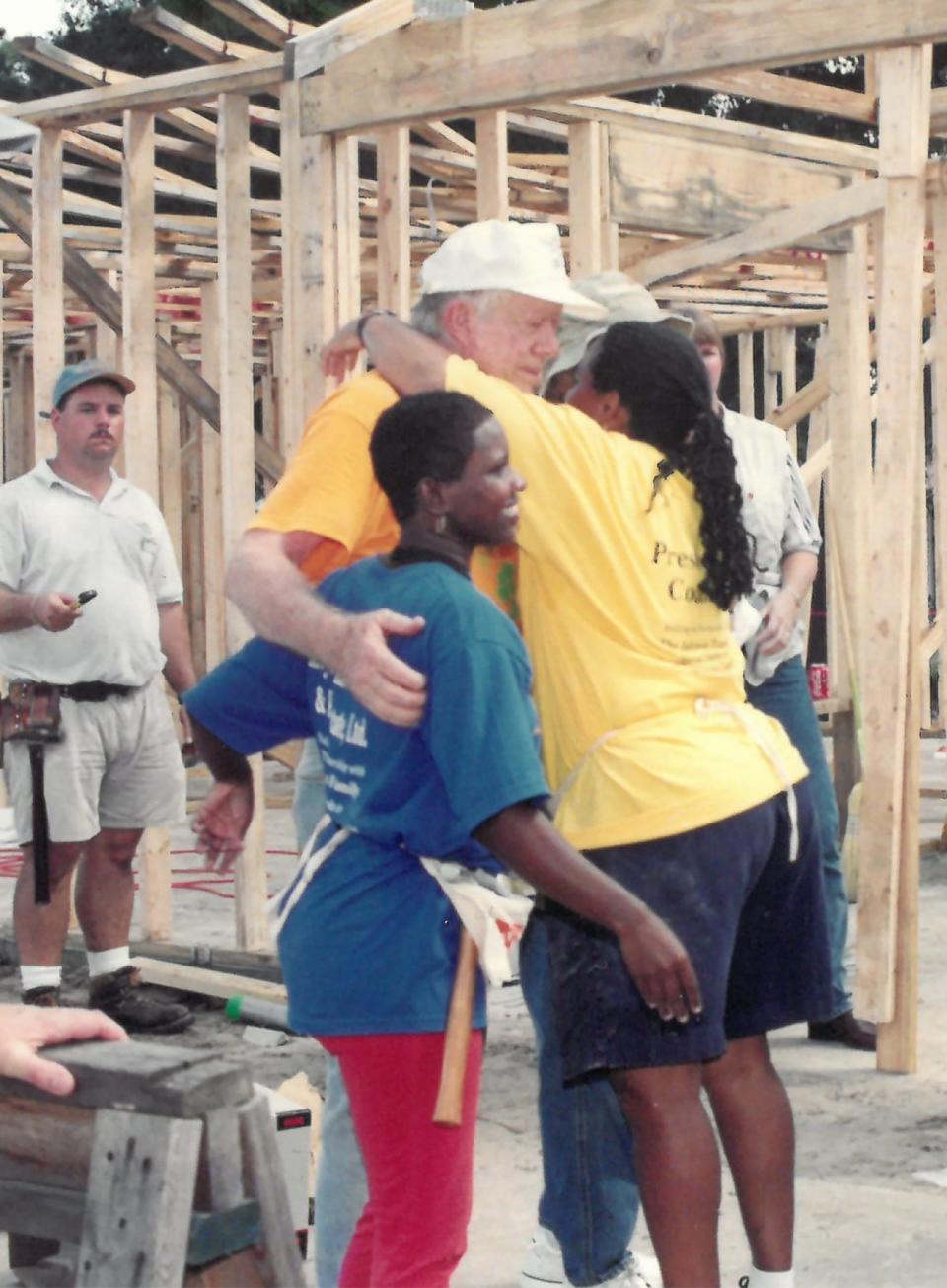Former President Jimmy Carter on his 2000 HabiJax work: 'Jesus was also a carpenter'

- Oops!Something went wrong.Please try again later.
- Oops!Something went wrong.Please try again later.
Editor's Note: This is a September 2000 interview former President Jimmy Carter gave the Times-Union when he was in Jacksonville for a home-building project with the local affiliate of Habitat for Humanity.
Q. What has been more fulfilling for you spiritually in your life: The time that you spent hammering out peace accords or the time that you spent on projects like Fairway Oaks, where you're hammering people's walls, putting up people's homes?
A. It's hard to distinguish between them because they're quite different. As you know, the savior that I worship is a prince of peace and it just happens that Jesus was also a carpenter. I don't think there's any difference between waging peace among nations at war or people at war on the one hand, which is very gratifying and what we still do, and also giving people a decent life and letting them exhibit in their own existence basic human rights. I think human rights has been a major commitment of mine, not only freedom from persecution, freedom to choose one's own leaders, but also the right to have food to eat and clothes to wear and a place to live of which they don't have to be ashamed. So I wouldn't want to say that waging peace is any more gratifying than building a house. But I think they both have the blessing of God. And they both, I think, express in a unique way the fulfillment of God's freedom on earth.
Mark Woods 2020: Jimmy Carter living an extraordinary, ordinary life 40 years after White House
Q. In Living Faith you tell a story about a family, if I have this correct, from Olympia that lived in a car and when their [Habitat] home was built, the boy, there was a boy in the family, who came out of the car or came onto the site and screamed, "We won, we won." Can you describe for me seeing things like that, the emotion of a Habitat build for yourself and for the families that move into these homes?
A. Well, last year we went to the Philippines. We had about 10,000 volunteers there as we do here in Jacksonville this week. They were on five different locations, not all in one location like this. This is very impressive. And the families, I would say, would probably be more destitute and have a much lower level of income than the ones that were likely to buy the homes here. One woman who occupied the house next to ours with her husband and four children had been living in an abandoned septic tank for four years and the size of the septic tank was about four feet wide and eight feet long. And that's where they spent every night. Those six people. And then they moved into a home about a third as big as these, 300 square feet. And it was like a dream fulfilled for her. She just could not believe when she saw that that was going to be her own house. And there were 293 very tiny homes built that week in the Philippines. We've also been alongside the Danube River in Hungary and on a desert hillside in Tijuana. But all the volunteers who went there slept in pup tents for six days and we didn't have any running water. We couldn't take a bath or anything for six days but we finished 100 homes there, small homes, again. So I think all of our experiences in building Habitat homes in different places and in different years have been inspirational to us. And at the end of each [Jimmy Carter Work Project] Week, when we give the family a Bible, and give them the keys to their own house, and try to say a few words, we're always choked up, we always have tears running down our cheeks and we always feel a spirit of equality and personal love with that homeowner family that's almost indescribable.

Q. Where does it come from? Where does that love come from?
A. I think it comes from a sense that we are fulfilling in a rare fashion, one of the deepest commitments of our individual faith. I happen to be a Christian. And I know that Christ, in his 33 years or so on earth, reached out to the poor, the inarticulate, the helpless, the sick, the sinful. And that's the basic message he gave to all of us. We profess to follow Christ … and we go to church in our nice clothes, we drive in our nice automobiles. We worship in very sincere fashion with people just like us. And then we look around and say how can I copy the example that Christ set because I don't even know any poor people. I've never been in a poor person's house and had a cup of coffee. I don't know a single poor person's family well enough to know the names of their teenage children. I certainly would not know a poor person well enough to invite them into my house or to go to a baseball game with my children. Habitat gives us a way to break down that very difficult barrier and to reach out in a spirit, not a big shot doing charity for another person, but on an absolutely equal basis so that the homeowners work totally equally with us and at the end of the week we have that sense of sharing that is a rare experience in the life of a human being.
'Labor of love': Jacksonville native produces Jimmy Carter documentary
Q. In the year 2000, with as much poverty and substandard housing that there is, why is it still there? You mentioned earlier [in a press conference] that it hasn't been campaign issue. Is it something that people just aren't paying attention to?
A. Well, in a free enterprise system like ours, the primary source of housing are private entrepreneurs who build apartments and houses and either sell them or rent them for profit and that's fine, that's the way it ought to be, I think, in our country. But the secondary responsibility should be the federal government. And it was when I was president, and it was when Richard Nixon was president, and when Gerald Ford was president. Nowadays it's not that way. A commitment to federal housing, that is low-interest loans for people to buy their own houses or subsidized rent for people that can't afford the prevailing rent but are working families, that commitment is gone. And I hope that Habitat, in addition to building houses, has been and will be increasingly able to elevate the need for housing to a much higher level. So that in the future, the members of Congress and the members of the Senate, presidents and so forth will help. For instance, next year we have commitments from every U.S. senator to sponsor a Habitat house. It's been led by Bob Graham, by the way, the senator from Florida. … But I think this appeal to talk to leaders in the legislative branch of our government to boost up housing as a need will pay rich dividends.
This article originally appeared on Florida Times-Union: Jimmy Carter in Jacksonville in 2000: Habitat 'copying Christ's example'

